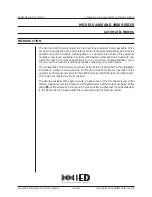
(8)
is no signal at the mixer before turning on the power amps. To be sure, slide all the faders
to the bottom and switch all controls to the zero position.
(45) The BOOTH output gives you an additional option of connecting an amplifier in order to, for
example, feed the signal into your monitors or to bring sound to an extra area. The BOOTH
output level is regulated by using the BOOTH LEVEL control (20) of the MASTER section.
(46) Using the TAPE output you can record your music by connecting devices such as tape decks,
DAT recorders etc. Unlike the MASTER output, the output volume is fixed, making it necessary
for you to adjust the input level on the recording device.
(47) The POWER
switch power the mixer on. You should always make sure that the POWER switch
is in the Off position when initially connecting the unit to the mains.
(48) This is the connector for the power cable. This is where the advantage of a sophisticated int-
ernal power supply can be seen: the pulse behaviour of each amplifying circuit is mainly det-
ermined by the voltage reserves available. Each mixing console is equipped with numerous
operational amplifier (op amps) to process line level signals. Due to limited output of their p-
ower supplies, many mixing consoles show signs of stress when subjected to heavy loads.
But not your mixer: the sound is always clear and transparent.
(49) FUSE HOLDER / VOLTAGE SETTING
.
Before connecting the unit to the mains, ensure that
the voltage setting matches your local voltage. Blown fuses should only be replaced by a fuse
of the same type and rating. On some units, the fuses holder can be switched to on of two p-
ositions, i.e. 230 V and 120 V. Please note: should you desire to operate the unit outside Eu-
rope at 120 V, a higher fuse rating is required.
Please take note: Merely switching the unit off does not mean that it is fully disconne-
cted from the mains. When not using the unit for prolonged periods of time, please u-
nplug the unit s power cord from the power outlet.
To disconnect power from main, pull out the main cord plug. When installing the prod-
uct, ensure that the plug is easily accessible. If mounting in a rack, ensure that the ma-
ins can be easily disconnected by a plug or by an all-pole disconnect switch on or near
the rack.
3. SPECIFICATIONS
AUDIO INPUTS
Mic 40 dB Gain, XLR,
electronically balanced input stage
Phono in 40 dB Gain, unbalanced input
Line in 0 dB Gain, unbalanced inputs
CD in 0 dB Gain, unbalanced inpts
Return 0 dB Gain, unbalanced input
AUDIO OUTPUTS
Master max.+21 dBu
Booth max.+21 dBu
Tape typ. 0 dBu
Send typ. 0 dBu
Phones Out max. 180 mW @ 75
Ω
/1% THD
(1) Read these instructions.
(2) Keep these instructions.
(4) Follow all instructions.
(5) Do not use this device near water.
(6) Clean only with a dry cloth.
(7) Do not block any ventilation openings. Install in accordance with the manufacturer s instructions.
(8) Do not install near any heat sources such as radiators, heat registers, stoves, or other app-
aratus (including amplifiers) that produce heat.
(9) Do not defeat the safety purpose of the polarized or grounding-type plug. A polarized plug
has two blades with one wider than the other. A grounding type plug has two blades and a
third grounding prong. The wide blade or the third prong are provided for your safety. If the
provided plug does not fit into your outlet, consult an electrician for replacement of the ob-
solete outlet.
(3) Heed all warnings.
1. IMPORTANT SAFETY INSTRUCTIONS
CAUTION:
To reduce the risk of electric shock, do not remove
No user serviceable parts inside; refer servicing to qualified personnel.
the top cover (or the rear section).
WARNING:
To reduce the risk of fire or electric shock, do not expose this appliance to rain and
moisture.
This symbol, wherever it appears, alerts you to the presence of uninsulated dangerous
voltage inside the enclosure-voltage that may be sufficient to constitute a risk of shock.
This symbol, wherever it appears, alerts you to
instructions in the accompanying literature. Please read the manual.
important operating and maintenance
2. DETAILED SAFETY INSTRUCTIONS:
(1)
























